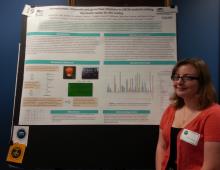Over the last year, I, along with undergrads Justine Celli, Jessica Cooper, Elizabeth Brady, and Candice Passerella, worked on developing a STI (sexually transmitted infection) test for chlamydia and gonorrhea for UNCW students that was effective, cost efficient, and discreet. With the help of Dr. Kevin Kiser, Abrons' Student Health Center, and CSURF we were able to purchase supplies and confidentially collect student urine samples and survey data to identify STI risk factors. These samples underwent DNA isolation, PCR, and gel electrophoresis in order to reveal the results of the sample. After the testing, students were sent their results through the health center and were reviewed by our lab group to identify correlations between risk factors and positive samples. We were fortunate enough to be able to present at the American Society for Microbiology 2015 General Meeting in New Orleans, the ASM-NC 2015 meeting, and the UNCW showcases for Spring and Fall of 2015.
I first began exploring UNCW undergraduate research opportunities toward the end of the 2013 spring semester, in my sophomore year, under the advice of my faculty academic advisor Dr. Potts. After a year and a half, this has been the most enriching experience of my college academic career so far. I was hoping to gain greater lab etiquette and have greater comfort in lab techniques that would aid me in pursuing a career in Biology, and I do.
I obtained much more than I thought I would through applied learning, including skills in networking, scientific writing (for both papers and posters), presentation skills, and improvement in analysis and attention to detail. Through the experience, I have seen both myself and my lab mates extend these tools to the classroom and even in our daily lives. One of the most challenging things I have faced in applied learning is time management. In last year's project, our group worked very hard in order to gather the student samples we needed from the student health center and achieve accurate results in a brief time frame. We learned how to work together in teams to run the samples and achieve results faster; since we all had different schedules, if there was something time sensitive that needed to be completed, one person could always coordinate with the rest of the group to get the task done.
I was surprised at the many opportunities this DIS has opened for me. With my current experience, in addition to my current BIO 499 honors project, I was surprised to find that I now qualify to apply for for Ph.D. graduate programs at many universities and medical schools that specifically require a minimum of two years of lab experience. Several of my peers who have recently graduated have told me that having undergraduate research experience helped them get in to graduate school, and I am sure that many employers will find the experince to be a valuable asset as well.





